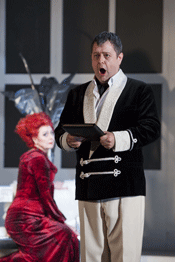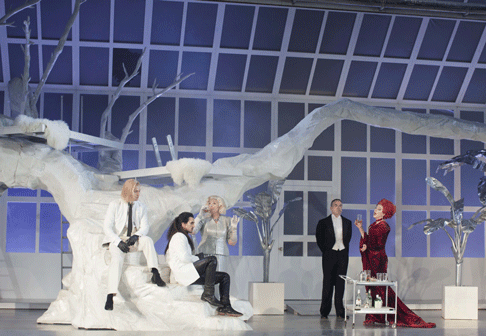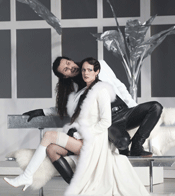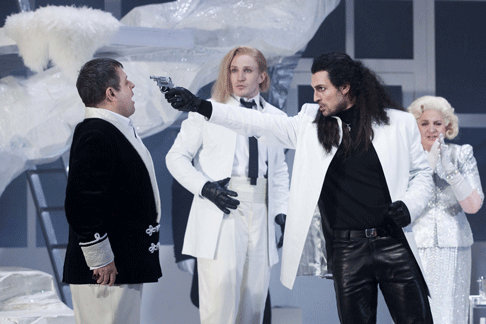26 Jun 2011
Viva Vivaldi — Garsington Opera 2011
Garsington Opera — in its superb new home on the Wormsley estate in rural Oxfordshire — has yet again confirmed the merit of its decision to promote Vivaldi’s long-ignored operas.

Garsington Opera — in its superb new home on the Wormsley estate in rural Oxfordshire — has yet again confirmed the merit of its decision to promote Vivaldi’s long-ignored operas.
The most recent offering is his La Verità in cimento (Truth put to the test) and Garsington have a hit on their hands if the first two performances are anything to go by. The plot is absurd, convoluted and comes down to the effect of one decision, years ago, to switch two babies (and therefore their inheritance) which in turn drives this drama of human love, greed and cold-blooded power seeking. The characters are a dysfunctional royal family whose ruling Sultan is a well-meaning tyrant who makes that one big decision but then lives to regret it as his extended family start to tear each other’s throats out when they learn of the deception as the boys come of age.

This is high-baroque opera, written by the canny Red Priest in 1720, and it is interesting to note that like his near-contemporary Handel, Vivaldi finds the moral (and immoral) dilemmas of the ruling classes of the utmost interest and worthy of his finest musical expression — after all they were his paymasters and themselves much concerned with the problems of succession, inheritance and political marriage. Unlike Handel however, the Venetian composer doesn’t tend to investigate his character’s deepest emotional conflicts with an extensive series of formal arias in classic da capo form — his music is lighter, fleeter and less organised. And yes, let’s face it, less memorable. However, there are some stand-out moments in this charming and melodic score which reveal some very un-Handel -like trios and ensemble numbers which seem to prefigure an altogether different genre of opera writing still very much on the horizon.
As the machinations of this sumptuously-dressed family unfold (much fur, leather and silk worn by all in a clever mix of styles) there is little action per se other than inside each character’s head — so all credit to director David Freeman for making the most of a delightfully outré set designed by Duncan Hayler which offers us an icy palace of glass, metal and white fur rugs with a gleaming, huge white tree dominating as a centre piece. The tree, whose two main branches sweep to the far sides of the stage, presumably symbolises the two warring factions of the two sons and their respective mothers (Sultana Rustena and Mistress Damira) but it also acts as a refuge, love-nest, and lair with its varying levels of platforms and steps. This is clever use of space, and together with the rear and side exits this configuration helps the story zip along as effectively and wittily as does the music from the pit below, directed (and, it would sometimes seem, driven almost physically) by a bobbing, sweeping and multi-tasking Laurence Cummings.

With all the emphasis on the emotions and thoughts of the characters and little physical action or change of location, it is obviously supremely important to have the right bunch of performers and once again Garsington must be congratulated on getting it right. The casting splits into two near-equal halves of the three older generation characters of Sultan, his Sultana, and his long-established Mistress and the three main young characters of his two sons and a visiting Princess who they both (naturally) fall for. Paul Nilon, Jean Rigby and Diana Montague fulfil those elder roles with enormous energy, musicianship and effortless virtuosity: Nilon’s flexible and expressive tenor and stagecraft are as good as ever as the Sultan, Jean Rigby’s (Sultana Rustena) dark mezzo soprano lends itself to her character’s emotional highs and lows (she has a gorgeous slow aria of despair “Fragil fior”, with recorder obbligato, that drew deserved applause), and Diana Montague (Damira, mezzo soprano) was stunning in her portrayal of the wronged Mistress who plans revenge — elegant and fluent coloratura mixed with effortless long-lined phrasing which mirrored her equally elegant couture gowns. These seasoned performers were the musical core of the production, holding everything together with an easy command of the idiom.

Flying higher above them, musically at least, were the younger generation of singers and characters and here the casting was almost as sure-footed. The young soprano Ida Falk Winland (winner of the Song Prize in the 2008 Ferrier competition) divides her time between her native Sweden and the UK at the moment and has an attractive voice with both a bit of weight to it and an obvious facility for Vivaldi’s ornate lines. She was often singing with either one or both of her “suitors”, the two half-brother princes who, in this production (unlike in the original of 1720, )are sung by countertenors Yaniv d’Or and James Laing, and as it often the way with this voice type the soprano out-sang both in terms of sheer volume. This did tend to unbalance the music somewhat which was a shame as there is a terrific trio for the three which could have been stunning, and perhaps needed a little adjustment on the part of the young Swede for the greater good of the ensemble sound. Yaniv d’Or, ( Melindo), who is not well known in this country, sang and acted with commitment and verve but his voice is not one that immediately attracts. James Laing (Zelim) has a sweet tone, more even and polished than his stage-brother, and I liked his easy top and legato in his more reflective arias. Two non-speaking roles of butler and gardener (the latter oddly placed throughout at the side of the stage busily tying and untying bunches of herbs and flowers — your guess is as good as mine) are uncredited in the programme book.

This might not be world-class opera seria (or buffo) but it is fun, it’s musically fleet-footed and charming , it’s cleverly-produced and directed, and the singers are well-cast and attractive: what more does one need for a high-summer’s evening entertainment in the lush green of an English rural estate? Here’s to Garsington’s next exposé of Vivaldi’s “lost” operas — they are setting themselves a high standard.
Sue Loder
Next performances: 25th, 29th June and 1st, 4th, July. Garsington (at Wormsley), Oxfordshire, UK.